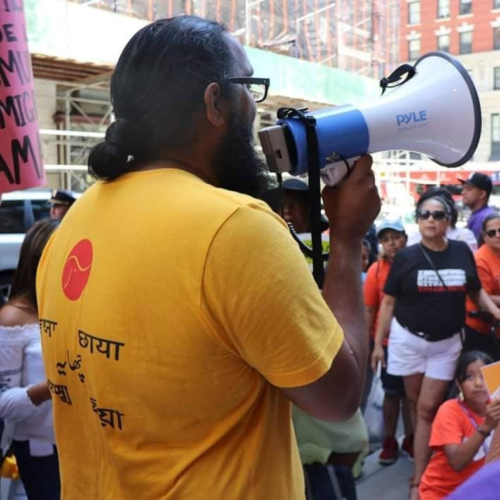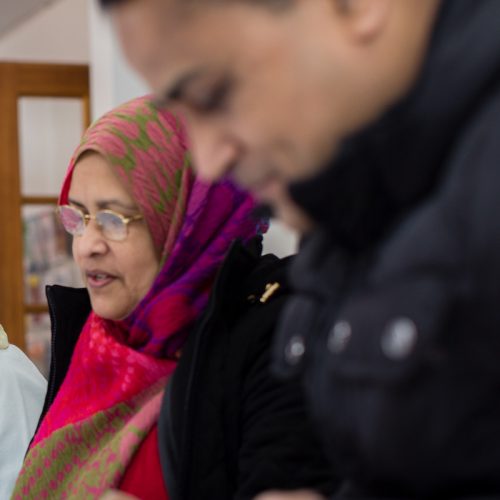
Support Chhaya CDC in building the power, housing stability, and economic well-being of South Asian and Indo-Caribbean communities in New York City. Donate Today!
As a longtime resident of Queens, I see every day how my neighbors are feeling the impacts of a tight housing market. Skyrocketing housing prices and limited housing options are forcing longtime residents to consider leaving — particularly low- and moderate-income families, immigrants, communities of color and essential workers, the communities that make the World’s Borough the special place it is.
Renters are struggling to find affordable apartments. Aspiring homeowners, including many who were raised here, can no longer afford to buy in their own neighborhoods. Existing homeowners are struggling to afford their mortgages or property taxes.
Accessory dwelling units, or ADUs, including basement and cellar apartments or apartments in structures like garages or sheds, present an affordable housing alternative, but under current New York City zoning law, most of these units are illegal and not subject to the same oversight as other traditional units. But New York City is in no position to turn away viable housing options. Instead of shying away from the challenge of legalizing ADUs, we should embrace and enhance them. If we’re going to unlock more affordable housing options across the city, we need to legalize ADUs, and updating our outdated zoning laws is a vital first step.
While acronyms like ADUs might seem unfamiliar, New Yorkers know basement apartments. In the outer boroughs, most of us know someone — a relative, a neighbor, a friend — who lives in one of the estimated 376,000 basement apartments around the city. Despite their prevalence, and the glaring need for more housing that these units address, they are not legally recognized, leaving homeowners at risk of fines and enforcement and denying tenants the same safety precautions that other New Yorkers get in typical apartments and other homes.
Several cities across the country, from Portland, Ore. to Princeton, NJ, have already legalized basements and other accessory units. In California, maybe one of the few states that rivals New York’s housing and affordability crises, ADUs are proving to be an effective solution.
In Queens, where close-knit communities and deep family ties encourage many families to stay in their neighborhoods, ADUs can be an essential tool to support multigenerational households. Whether for an older New Yorker with a fixed income, or a young person between jobs, or an individual striving for home ownership someday, ADUs offer a housing solution that is manageable financially and close to home in proximity.
ADUs present homeowners in Queens with earning potential and a means to offset the ever-increasing cost of property taxes and maintenance. Renting out a basement apartment would create an additional income stream for homeowners and ensure financial security. The option to rent out a basement apartment or attached unit can empower homeowners to overcome the mounting financial pressures of homeownership and stay in their homes.
But as long as basement apartments and other ADUs remain unregulated and illegal, their potential to address the affordable housing crisis and ensure greater financial security and safety in neighborhoods like mine can’t be realized.
That’s where the City of Yes for Housing Opportunity comes in. This citywide proposal, which has been the subject of discussion among housing advocates and at community boards across the city over the past year, would update zoning restrictions, ease barriers to legalizing basement apartments and bring them up to code, ensuring they are safe and habitable, while providing tenants with the same protections and rights as those in recognized rental apartments, such as lease renewals and eviction protections.
City of Yes is a strong, viable path for the legalization of basement apartments and other ADUs. And yet, many people have been influenced by fear-mongering that City of Yes will destroy our neighborhoods, or that adding legal, safe and affordable housing units would somehow burden our communities. On the contrary, expanding our housing options would strengthen our communities by providing homeowners with greater financial stability and renters with safe and affordable housing options, minimizing displacement and foreclosure, and preserving the character and cultural and economic diversity of my home borough.
It’s time to turn the page on decades of inequitable housing policy and embrace a future where everyone has access to safe, affordable housing. It all starts with Queens getting onboard with the City of Yes.
Annetta Seecharran is Executive Director of Chhaya, a nonprofit community development corporation, and a resident of Jackson Heights.






Main Office:
37-43 77th St, 2nd Floor, Jackson Heights, NY 11372
Contact: 718.478.3848; info@chhayacdc.org
Press: press@chhayacdc.org
Richmond Hill Center:
121-18 Liberty Avenue, 2nd Floor, Richmond Hill, NY 11419
Contact: 718.374.3371; info@chhayacdc.org
Press: press@chhayacdc.org
Copyright 2022 by Chhaya Community Development Corporation. All rights reserved. Chhaya CDC is a 501(c)3 non-profit organization.